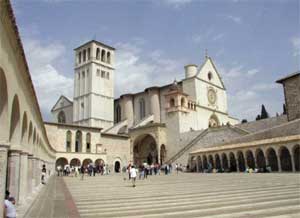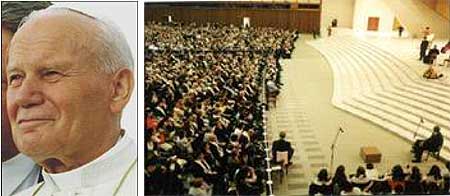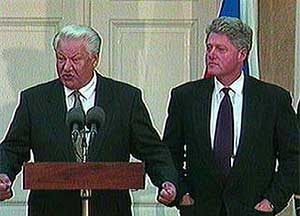
European
Nuclear Society
e-news
Issue 17 Summer 2007
http://www.euronuclear.org/e-news/e-news-17/Assisi-Symposium.htm

The Megatons to Development project
aims to promote the conversion of nuclear warheads into nuclear fuel and to
use part of the income raised to finance development projects in the southern
hemisphere.
The Assisi Symposium on 13 and 14 April (Figure 1) took place at the Holy Convent
of the Franciscan Order. It focused on the possible leading role that the European
Union could play in promoting this project, which was proposed by the Italian
NGO Comitato per una Civiltà dell’Amore
(Committee for a Civilisation of Love).

Figure 1: Updating Nuclear Peace and Development Symposium at
the San Francesco Sacred Convent in Assisi, with the participation of well-known
experts in the institutional, scientific, political and technological aspects
of international diplomacy (April 13 and 14, 2007 and October 15, 2005).
The symposium consisted of a series of presentations, followed by discussions during round table sessions. During the part of the meeting devoted more specifically to nuclear issues, which was chaired by Enrico Mainardi of AIN (the Italian Nuclear Association), a presentation was given by Bertrand Vieillard Baron entitled Global Worldwide Perspectives for Nuclear Power. The international focus of this presentation was the starting point for an interesting discussion on nuclear issues related to the main theme of the meeting.
The Comitato per una Civiltà dell’Amore held organised other official meetings in Assisi and Rome to discuss the proposal. The programme Conversion of Nuclear Weapons into Development Projects in the Southern Part of the World was first presented at the Italian Convention in Rome, on 11 November 2004, and subsequently at the International Convention of Assisi, on October 15, 2005. The socio-economic and technical aspects of the programme had been discussed at length with NGOs, scientists and ambassadors, together with the support of the Holy See. Irrespective of one’s personal religion convictions it was agreed that the use of nuclear weapons to indiscriminately destroy entire cities or areas, often wiping out their populations, should be unreservedly condemned. Using nuclear weapon materials in nuclear reactors to generate electricity is without doubt an initiative that promotes peace.
Thanks to international agreements reached on nuclear disarmament, the conversion of uranium from nuclear warheads into fuel for nuclear power plants is already in progress. The USA and Russia kicked off the Megatons to Megawatts Programme in 1992 thanks in part to the research first carried out in Italy by the late Edoardo Amaldi. Amaldi was an Italian scientist who, together with Enrico Fermi, contributed greatly to research and development in the field of nuclear energy.
In June 1992 the International symposium Conversion of Nuclear Warheads for Peaceful Purposes took place in Rome (Figure 2). Studies and analyses carried out by Italian, American, Russian, German, Japanese, French and Belgians scientists were presented in the presence of the Holy Father, Pope John Paul II. During the meeting an important speech was given by V. Mikhailov (the then Minister of Energy of the Russian Federation). Subsequent contacts were developed with a view to establishing Russian-American cooperation agreements.

Figure 2: International Symposium on the Conversion of Nuclear
Warheads for Peaceful Purposes, Rome, June 15 -17, 1992, in the presence of
the Holy Father, Pope John Paul II.
In the same year, the First International Symposium of Scientists and executives from the USA, Russia, Japan and Europe took place (Figure 3).

Figure 3: Presidents Yeltsin and Clinton at the time of the First
International Symposium of Scientists and Executives from USA, Russia, Japan
and Europe on the conversion of nuclear arms into fuel for nuclear power plants,
just before the USA-Russia nuclear conversion programme Megatons to Megawatts
was launched, in 1993.
In 1993, the USA-Russia nuclear conversion programme Megatons to Megawatts started up with the main goal of converting 20,000 nuclear warheads into fuel for nuclear power plants. Up until now, conversion activities have eliminated the equivalent of 12,000 nuclear warheads by converting them into nuclear fuel for use at commercial nuclear power plants. According to the US enrichment company USEC, 300 metric tonnes of highly-enriched uranium (HEU) from Russian nuclear warheads have been downgraded to low-enriched uranium (LEU) fuel as part of the so-called Vital Energy and Non-proliferation Programme.
US commercial nuclear reactors use this LEU fuel to generate about 10% of the country’s electricity. The Megatons to Megawatts programme is now 60% complete. When the programme is completed in 2013, 500 tonnes of HEU – the equivalent of 20,000 nuclear warheads – will have been downgraded to LEU fuel. USEC implements this 20-year commercial agreement on behalf of the US government, in partnership with the Russian nuclear fuel cycle company Techsnabexport (Tenex). USEC pays Tenex for the separated work elements contained in the fuel. Up until the end of 2006, USEC had paid Russia more than 4.6 billion US $ (3.4 billion €). With annual purchases of more than 500 million US $, USEC expects to pay Russia more than 7.6 billion US $ by the end of the contract, in 2013. The LEU fuel obtained so far from the downgraded HEU can be used to generate enough electricity to power an average-sized city for more than 460 years, according to USEC. (www.usec.com/, www.tenex.ru/english.html)
The Megatons to Megawatts initiative is the main point of reference for this new Megatons to Development programme. A technico-economic feasibility study on the conversion of nuclear weapons into development projects in the southern hemisphere has been proposed. The conversion of weapons of mass destruction into new economic resources, starting from nuclear warheads currently being dismantled, would reduce the risk of apocalyptic disasters and create a new atmosphere for peace.
The energy obtainable from the uranium from 60,000 warheads (more than 1,000 tons of HEU) is equal to the power consumption of the world’s total population in one year. According to the organizers of the Assisi meeting, if all nuclear warheads were converted into fuel for nuclear power plants it is possible to benefit from an economic “dividend”. A preliminary assessment of this dividend has been made and with the appropriate support and consensus it can be used to boost development in the southern hemisphere. It is necessary to lobby the governments of the countries directly involved in the conversion of uranium, so that the return can promote economic development. It is also important to promote intergovernmental cooperation. The programme is very ambitious and must be very well organized. In this way Europe can contribute to the conversion of nuclear warheads via disarmament and can help the development of poor countries.
During the meeting in Assisi a kind of support programme – mainly in the southern hemisphere – has been proposed. This support is based on development activities in the form of mini-projects. According to the Comitato per una Civiltà dell’Amore, these mini-projects can be more effective than major ones. This has been borne out by mini-projects successfully carried out by missionaries, NGOs and, recently, by some international organizations.
The objectives of the programme remain of significant relevance today – especially considering global changes that have taken place over the last 15 years. The development needs of poor countries must, more than ever before, be taken into consideration, without ignoring that now Russia and China (and very soon India) are major players on the global energy stage. One must not forget the political changes that have taken place in the Middle East during the same 15 years, as they too are relevant in today’s world political scenario.
Justice, peace and dialogue were the main messages to emerge from the Assisi Symposium. When it comes to nuclear issues, justice, peace and dialogue for the entire world is a must - irrespective of culture or religion. Even if some of these proposals seem very ambitious, discussions are nevertheless necessary due to the present world situation. At the moment greater political and institutional support is needed in order for the Megatons to Development programme to take off. The European nuclear industry, NGOs and European Institutions can help promote this process of conversion and development. And the role of international organizations must be amplified too.
|
||||
![]()
© European Nuclear Society, 2007